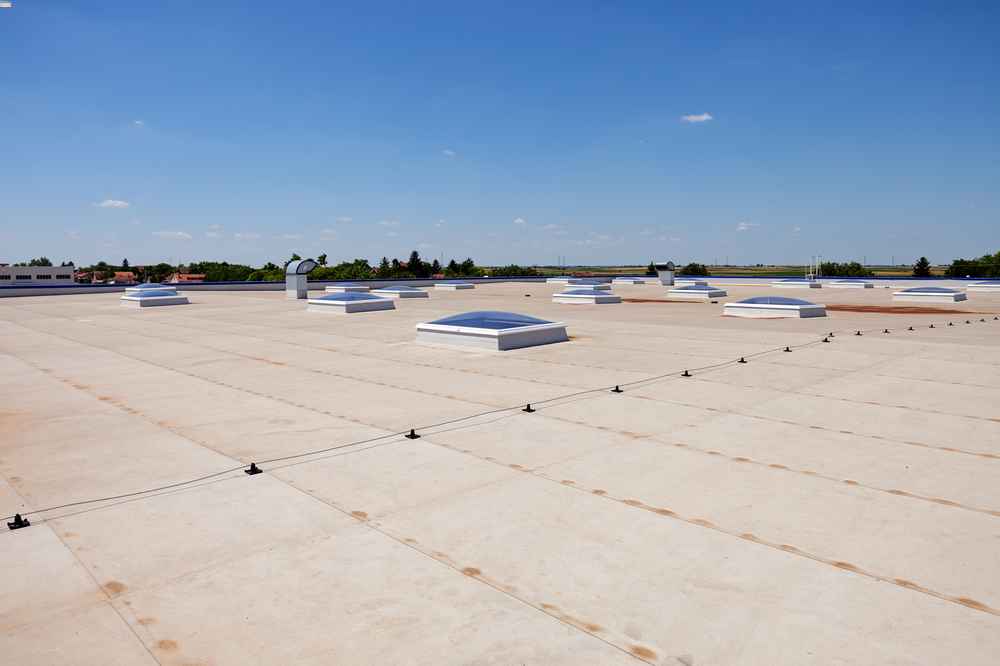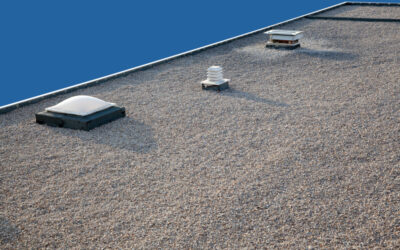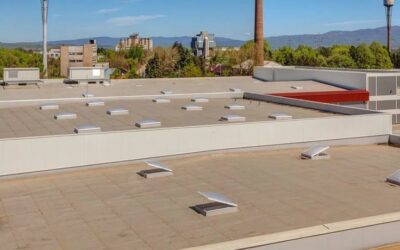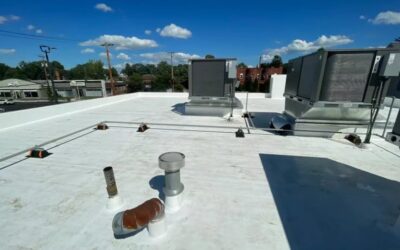Installing a commercial roof is a major project that needs to be done with precision and expert workmanship. Your commercial roof protects your business and the people who work for you. There are many commercial roofing materials out there, such as modified bitumen, metal, TPO, EPDM and PVC, and it is hard to narrow it down to just one. But that’s why we’re here.
Industrial Roofing Contractors has years of experience installing, repairing and restoring commercial roofs. Your business property will be in good hands with our trusted commercial roofing experts. Give us a call today for a free consultation.
Single-Ply Membrane Roofing
Single-Ply Membranes are synthetic, polymer-based roofing materials that provide a single layer of roof protection for your commercial building. Vital for insulation and waterproofing, they can last over 30 years if properly maintained. There are 3 main types of single-ply membrane roofs:
- PVC Roofs (Poly Vinyl Chloride)
- TPO Roofs (Thermo Plastic Polyolefin)
- EPDM Roofs (Ethylene Propylene Diene Monomer)
PVC Roofing
PVC is a single-ply membrane very commonly used on commercial roofs. Being a type of plastic, it offers business owners and property managers affordability alongside durability. This is why it is the third most widely made synthetic polymer.
Advantages of PVC Roofing
There are multiple benefits to installing a PVC roof on your commercial property. These include:
Affordable Life Cycle Cost
Compared with other roofing membranes, PVC retains a high reflectivity value over time, which offers higher energy efficiency than most roofs.
Environmentally Friendly
With its Energy Star rating and its highly reflective material, PVC is the obvious choice for environmentally concerned companies.
Tax Rebate Qualification
Companies with a PVC roof qualify for roof tax paybacks as well as LEED credit qualification.
Waterproofing
Strong seam bonding and puncture resistance make this material one of the most water-resistant in the commercial roofing industry
Durable
PVC is an industry-standard because it is engineered to stand the test of time. PVC has a fleece backing and is available in thicknesses up to 80 mil, allowing for even better resistance to tearing or water issues.
EPDM Roofing
EPDM roofing is a popular choice for commercial roofing as it is cost-effective, durable and well-suited to low-slope or completely flat roofs, though it can be configured for any commercial roof type. A long-lasting polymer blend that can withstand the elements, EPDM’s application is simple but does require the expertise of professional commercial roofers, particularly at a larger scale.
Advantages of EPDM Roofs
Affordability
Probably the biggest perk of EPDM roofing is its affordability. Not only are the materials themselves relatively cost-effective, but the installation process is also quick and easy. So, without paying for expensive supplies and hours of contractor labor, you’ll be getting a good deal in exchange for top quality. If you’re on a tight budget, this could be the commercial roof for you.
Durability
EPDM roofs are very strong and are able to withstand the harshest weather conditions. Because it doesn’t require seams like most roofing types, it is almost impossible for water to penetrate EPDM’s rubbery surface. Its waterproofing ability is superior, as well as its fire resistance, both of which contribute to the material’s excellent durability. EPDM ranks high on the durability scale, the great thing is that when repairs are required, they are easy, quick and relatively inexpensive to implement.
Sustainability
Not much energy is required to manufacture EPDM, and its long lifespan makes it a sustainable commercial roofing option. It is also 100% recyclable.
Temperature Regulation and Energy Savings
EPDM tightens up when the weather gets cold, and expands when things heat up. That way, it traps the heat in on cold days and releases it when it’s hot, reducing energy consumptions, thus foregoing the need for artificial temperature regulators.
Longevity
EPDM has an incredible life span of at least 50 years with regular professional maintenance and repairs. Being an affordable commercial roofing option, it offers great value for money considering its long life span along with all the properties it has to offer.
TPO Roofing
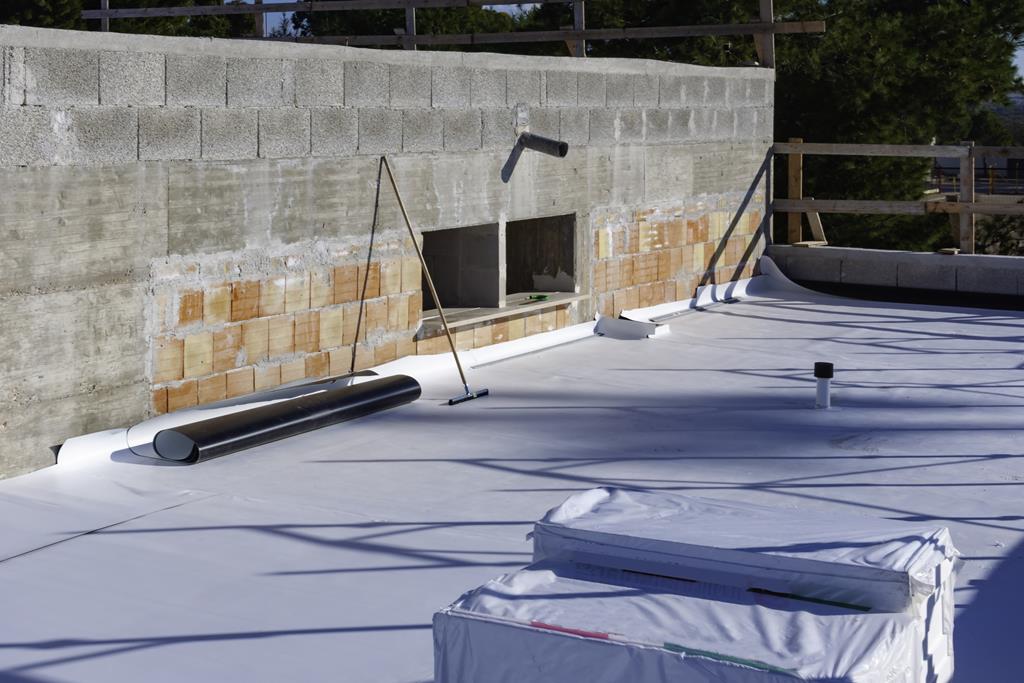
TPO (thermoplastic polyolefin) is one of the most sought-after options for commercial roofing. The single-ply membrane is used on flat roofing systems, making it a popular roofing option for large, commercial structures. TPO’s energy efficiency and long-lasting nature together with its affordability make it a top choice in the commercial roofing industry.
Advantages of TPO Roofs
Energy Efficiency
Energy efficiency is perhaps the key drawcard for commercial properties to opt for TPO as their roofing material of choice. Commercial spaces can be large, requiring several resources to heat up in the winter and cool down in the summer. With TPO roofing, the specialized surface is key to deflecting heat when it’s hot and absorbing warmth when it’s cold. This will result in energy and cost savings, as well as extend the lifespan of the building’s heat regulators.
Strength and Durability
TPO is impervious to mold, rot and tear impact, thanks to its flexible membrane. It is able to adapt to the building’s movements and is able to handle expansion and contraction very well.
Affordability
Relative to other commercial roofing options, TPO is cost-effective and will result in energy bill savings down the line too. Its easy installation also means that your business will be saving on labor costs at installation.
Industrial Roofing Contractors understands the intricacies of commercial roofing installations and will guide you through all the options and what’s best for your situation. Contact us today to schedule a free roof installation consultation.


